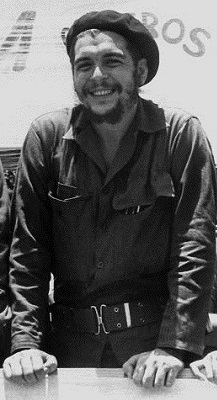|
~ Ernesto Che Guevara
~ Galéria
~ Oldal
~ Bejelentkezés
~ Vissza a Főoldalra
Ernesto Che Guevara, az argentin származású forradalmár, miniszter, gerillavezér és író, Buenos Aires-ben szerzett orvosi diplomát, majd a kubai forradalom során jelentős szerepet játszott a szigetország felszabadításában és újjáépítésében. A kubai gazdaság talpraállításáért dolgozott, küzdött az oktatás és az egészségügy fejlesztéséért, az írástudatlanság és a faji előítéletek felszámolásáért. Saját példájával népszerűsítette az önkéntes munkát. Kongóban és Bolíviában is harcolt - harminckilenc éves volt, amikor az amerikai-bolíviai csapatok csapdába ejtették és kivégezték.
| | |
|

| | |
|
|
|
Helen Yaffe: Ernesto Che Guevara: a rebel against Soviet Political Economy
|
|
|
In January 1962 Guevara told colleagues in Cuba's Ministry of Industries (MININD): 'In no way am I saying that financial autonomy of the enterprise with moral incentives, as it is established in the socialist countries, is a formula which will impede progress to socialism'.[1] He was referring to the economic management system applied in the Soviet bloc, known in Cuba as the Auto-Financing System (AFS). By 1966, in his critique of the Soviet Manual of Political Economy, he concluded that the USSR: 'is returning to capitalism.'[2] This paper will demonstrate that Guevara's analysis developed in the period between these two statements as a result of three lines of enquiry: the study of Marx's analysis of the capitalist system, engagement in socialist political economy debates and recourse to the technological advances of capitalist corporations.[3] At the same time Guevara was engaged in the practical experience of developing the Budgetary Finance System (BFS); an alternative apparatus for economic management in MININD.
Guevara was head of the Department of Industrialisation and President of the National Bank in 1960 when all financial institutions and 84% of industry in Cuba were nationalised. His BFS emerged as a practical solution to problems thrown up by the transition from private to state ownership of industrial production. Cuba had an unbalanced, trade dependent economy dominated by foreign interests, principally from the United States. The production units which passed under the Department's jurisdiction ranged from artisan workshops to sophisticated energy plants. Many faced bankruptcy while others were highly profitable. Guevara's solution was twofold: first, to group entities of similar lines of production into centralised administrative bodies called Consolidated Enterprises. This allowed the Department to control the allocation of scarce administrative and technical personnel following the exodus of 65-75% of managers, technicians and engineers after 1959; and second, to centralise the finances of all production units into one bank account for the payment of salaries, to control investment and sustain production in essential industries which lacked financial resources. With the establishment of MININD in February 1961, the BFS evolved into a comprehensive apparatus which embedded these organisational structures in a Marxist theoretical framework, to foster Cuba's industrialisation, increase productivity and institutionalise collective management.
[Read the whole article]
|
|
|


| | |
|
|
|
~ Ernesto Che Guevara
~ Gallery
~ Site
~ Log in
~ Back to the Main page
Ernesto Che Guevara, the Argentine-born revolutionary, minister, guerrilla leader and writer, received his medical degree in Buenos Aires, then played an essential part in the Cuban Revolution in liberating and rebuilding the country. He did his best to set up the Cuban economy, fought for the improvement of the education and the health system, the elimination of illiteracy and racial prejudice. He promoted voluntary work by his own example. He fought in the Congo and in Bolivia - he was thirty-nine years old, when he was trapped and executed by the joint American-Bolivian forces.
| | |
|
|

